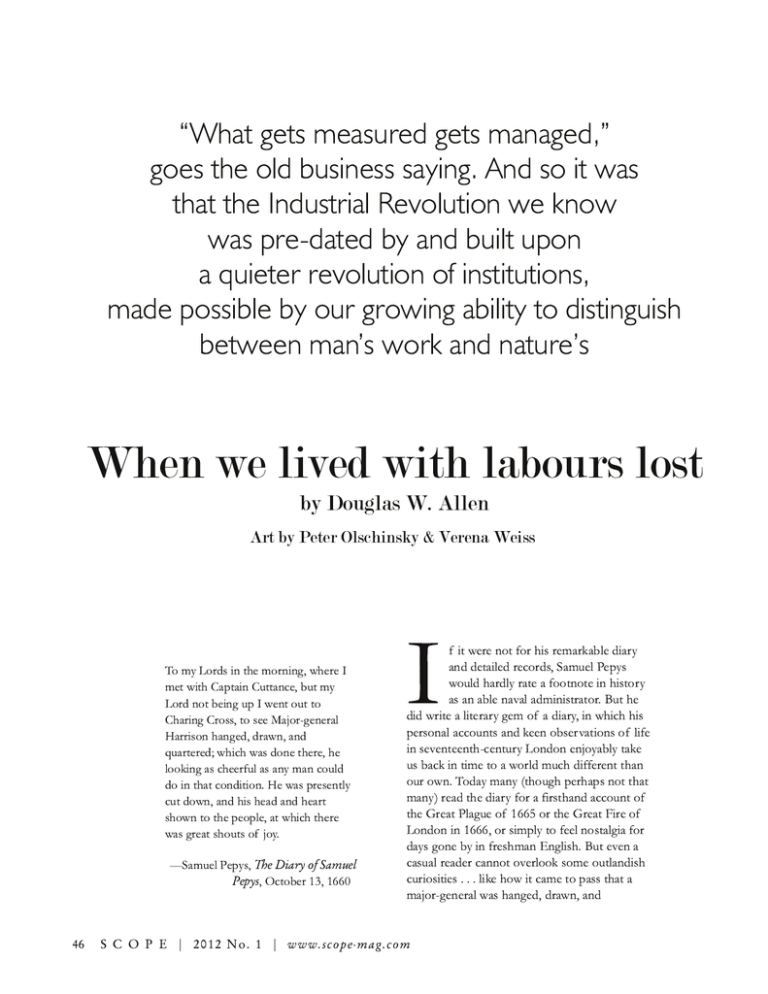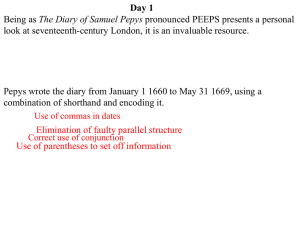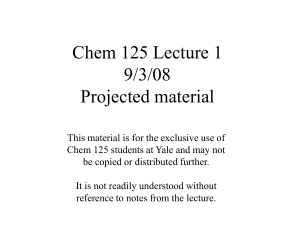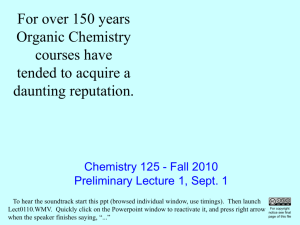“What gets measured gets managed,” that the Industrial Revolution we know
advertisement

“What gets measured gets managed,” goes the old business saying. And so it was that the Industrial Revolution we know was pre-dated by and built upon a quieter revolution of institutions, made possible by our growing ability to distinguish between man’s work and nature’s When we lived with labours lost by Douglas W. Allen Art by Peter Olschinsky & Verena Weiss To my Lords in the morning, where I met with Captain Cuttance, but my Lord not being up I went out to Charing Cross, to see Major-general Harrison hanged, drawn, and quartered; which was done there, he looking as cheerful as any man could do in that condition. He was presently cut down, and his head and heart shown to the people, at which there was great shouts of joy. —Samuel Pepys, The Diary ofSamuel Pepys, October 13, 1660 46 S C O P E | 201 2 No. 1 | I f it were not for his remarkable diary and detailed records, Samuel Pepys would hardly rate a footnote in history as an able naval administrator. But he did write a literary gem of a diary, in which his personal accounts and keen observations of life in seventeenth-century London enjoyably take us back in time to a world much different than our own. Today many (though perhaps not that many) read the diary for a firsthand account of the Great Plague of 1665 or the Great Fire of London in 1666, or simply to feel nostalgia for days gone by in freshman English. But even a casual reader cannot overlook some outlandish curiosities . . . like how it came to pass that a major-general was hanged, drawn, and w w w. s co p e - m a g. co m w w w. s co p e - m a g. co m | 201 2 No. 1 | S C O P E 47 quartered in public, much to the thrill of onlookers. Some readers are old enough to remember hanging as a capital punishment, but no one today has any experience with a public drawing and quartering. There is more to Pepys’s diary than gory dismemberment. By any account, Pepys was a successful man: chief secretary to the Admiralty, justice of the peace, member of Parliament, fellow and president of the Royal Society, and brother and master of Trinity House, to name only a few posts. Some of these positions ring familiar, others less so, but a closer inspection of any single office reveals many strange things. For example, Pepys got his start in the navy when his first cousin once removed, Sir Edward Montagu, was willing to act as his patron. A patron in Pepys’s day was a person of influence who, with a word, could make or break a career. A patron was almost always necessary for any advancement in what we would now call the “public service,” and Sir Edward had his own—a well-known character named King Charles II. Charles granted Montagu a number of titles, offices, and honors—including the 1st Earl of Sandwich—for his loyal service during the restoration of his Crown in 1660, and his positions allowed Montagu to influence the Admiralty to grant Pepys his first office, the clerk of the acts. Pepys had no administrative experience or formal knowledge of the navy, but this hardly mattered at the time. Patronage appointments were given to people whom the patron could trust; ability was a distinctly secondary matter. What was also strange about Pepys’s office, along with most others of the age, was that it became a matter of (mostly) private property once received. When Pepys became the clerk of the acts, he owned the office the way we now own our homes: he could sell, borrow against, and earn an income from it. As a member of Trinity House, Pepys was part of an ancient monopoly organization that built lighthouses and actually charged ships for the service. When he was elected to Parliament, very few of his countrymen were allowed to Adapted from The Institutional Revolution: Measurement and the Economic Emergence ofthe Modern World by Douglas W. Allen (University of Chicago Press, 201 1 ) 48 S C O P E | 201 2 No. 1 | w w w. s co p e - m a g. co m Pepys’ life was as ordinary as a human life could be, but it took place within a context of social rules, norms, and organizations quite alien to us today vote—perhaps none of them freely, given the lack of secret ballots, the influence of sheriffs, and the ownership of many boroughs by high nobility. Though a justice of the peace, he received no salary for his efforts, and he openly accepted bribes at his naval office. His day-today life was commonplace for a gentleman, but he also lived in quiet fear that someone might challenge him to a duel. Pepys provides a nice example of the paradox of life between the modern and the pre-modern world. On the one hand, his life was as ordinary as a human life could be: he worried about his supper and his gold, he was proud that his home had a spare bed for visitors, he pursued his mistresses, and he gossiped about his friends and coworkers. And yet, on the other hand, his life took place within the context of social rules, norms, and organizations quite alien to us today. In the West, patronage and bribes now imply corruption, duels are long gone, and universal suffrage with a secret ballot is a fundamental right. Indeed, it is this contrast in institutional context between the past and present that rivets students of history to the Pepys narrative. In general, what often attracts us to history is the exotic within the context of the ordinary. We marvel at the spectacular military leader in an otherwise common battle. We are drawn to understand polygamy and arranged marriage among almost universal monogamous heterosexual marriage. Although we relate to, and sympathize with, the complaints of the eighteenth-century shipowner over excessive port taxes, we are more curious about the private “tax farmer” who paid the Crown for the right to collect the dues. And, of course, we are flabbergasted at the seventeenth-century diarist who unabashedly traded naval contracts for every form of payment from cow’s tongue to sexual favors. If history did not have these exotic episodes, if the organization of life never changed, or if we could not relate to the individuals of the past, then history would make an unattractive study indeed. Fortunately, history has the common thread of humanity that makes it relevant. Doubly good is that its organizational detail changes over time and is therefore compelling and interesting. Economics provides a useful tool for understanding the past because the human experience, over time, is connected through a common economic reality. At the most fundamental level, all people at all times have dealt with the problem of scarcity. There has never been enough, there will never be enough, and as a result people always have been driven to find better ways to increase their wealth and consumption. Scarcity has several universal implications: choices always have had to be made, actions always have had costs, and there always have been winners and losers. Humans have always used innovations to reduce the level of scarcity; thus technology, which is everpresent in one form or another, has improved over time. Markets have also existed since antiquity, and life throughout history is a continuous attempt to get and produce more through exchange. The Romans had capital markets and interest rates. In many ways the baker of antiquity was similar to our baker on the corner because all bakers are simply trying to make a living. W hat then, in a broad sense, is different? What captures our attention when we see a historical society different from our own? Economists naturally tend to focus on measures of wellbeing such as technology, incomes, height, or the absence of violence. This is an economic history of quantifiable averages. Output has increased over time, along with population and per capita incomes—on average. Health is better, people are taller, transportation is faster—on average. This is all well and good, but it often fails to capture what many sense to w w w. s co p e - m a g. co m | 201 2 No. 1 | S C O P E 49 These institutions had an economic logic, being designed to solve incentive problems that arose in the pre-modern world be a greater difference. Armies today are not just more deadly on average; they look different. They wear camouflage, do not fight in tight formations, are not composed of foreign mercenaries, and do not receive compensation through the spoils of battle. If we go back to our friend Samuel Pepys, we see that a middle-class administrator in the British navy today would have more possessions and would live longer, but we are also aware that no one in the West today nonchalantly watches a man’s heart get ripped out in a public square. So we realize that there is more to change over time than just a difference in averages. Nevertheless, it is unfair to accuse economists of being completely focused on averages. Many have recognized that a major component of what differs over time are the rules we live by and how life is organized. For the moment, call these rules “institutions.” The more institutions differ over time, the more different the past appears. Today, in the West, the world is considered “modern.” By that is meant a world governed by a series of secular institutions: the rule of law; well-enforced property rights; elected democratic governments; human rights; public provision of courts, health care, national defense, and education; professional services; regulated markets; concerns over social welfare and income distributions; and the concept of individual liberty within a modern state. We are comfortable with corporations producing food, with public police investigating our stolen automobiles, with money used as a unit of account for everything, with wage labor, with free mobility, and with individuals determining who they will marry and what occupation they will have. Perhaps above all, we expect to have equal social standing among our neighbors. Ours is a society based on a concept of merit, and those who work hard and produce much expect to be rewarded. The race may not always be to the swift, but the laborer is worthy of his hire, and we believe that, with effort and a little luck, anyone can reach the top of the social 50 S C O P E | 201 2 No. 1 | w w w. s co p e - m a g. co m ladder. But it was not always so. Not so long ago there was a strong social class structure where a large gulf separated ordinary people from the elite, and seldom did one cross over from one station to the other. Masters controlled servants, and both knew their place in the world. Merit was valued, but it was not the coin of the realm—personal connections, conduct, and birth mattered much more. Markets and prices existed for votes, state offices, and roads. There were jails where criminals were temporarily housed, but no penitentiaries for long-term incarceration and reform. There was money, but many payments were made in kind, with truck and barter, or through gleaning scraps off the workroom floor. There were watchmen but no police. The institutional landscape was shockingly different in the pre-modern world. The reality is that around 1850 the modern world—the world containing the modern institutions we are accustomed to—emerged. This revolution was mostly centred on the changes that took place in the rules of public governance: the aristocrats, dueling, naval and army administration, lighthouses, private roads, taxation, factories, private police, and the evolution of criminal law. Other institutions changed as well, and some contemporary writers such as Marx and Engels noticed what was going on: The bourgeoisie, wherever it has got the upper hand, has put an end to all feudal, patriarchal, idyllic relations. It has pitilessly torn asunder the motley feudal ties that bound man to his “natural superiors”, and has left remaining no other nexus between man and man than naked self interest, than callous “cash payment”. . . It has resolved personal worth into exchange value, and in place of the numberless indefeasible chartered freedoms, has set up that single, unconscionable freedom—Free Trade. Although they clearly did not approve, Marx and Engels were on to something. They noticed a change was afoot; they recognized the past was not all bad; and they identified freedom to exchange as a key to the modern world. M y purpose here is to make the general claim that “measurement costs” are the common source behind the Institutional Revolution that troubled Marx and Engels. Free trade and the ability to socially interact with only “naked selfinterest” and “callous cash payment”, required the ability to measure what was being traded. Until this ability materialized, communities required “patriarchal relations,” “feudal ties,” and “chartered freedoms” to get many things done. Which is not to say there was only a single source of change. Several factors drive institutions to arise and develop; I wish to highlight an important one that has been ignored. Many pre-modern institutions—at least the ones we find strange and fascinating—fell into two broad classes. In one class were those based on trust between a patron or master and his servant. In the other class were institutions designed to exploit the entrepreneurial spirit of private incentives; an office sold to its holder was known as a “venal” institution. Examples include the purchase of military commissions, the purchase of private offices, and private investigations of crime. These strange institutions had an economic logic, being designed to solve incentive problems that arose in the pre-modern world; that is, to generate wealth by reducing shirking, pilfering, embezzlement, theft, dereliction of duty, cowardice, and the host of other bad behaviors that arise whenever people come together. The reason why the pre-modern world had institutions different from the modern world was simply because circumstances were different, and the reason why the Western world went through an Institutional Revolution was because those circumstances changed. And the most important circumstance to change was the ability to measure fundamentals such as time or distance. Measurement is necessary because we want to know things, and when interacting with other people what we often want to know is who to blame. Who is responsible for the bad w w w. s co p e - m a g. co m | 201 2 No. 1 | S C O P E 51 outcomes and for the good? Who is to be punished or rewarded? Choose any area of life and this problem is never far from the surface. Part of the problem is that we lack the allknowing powers of gods, but another part lies in the simple reality that nature plays an active role in life. A car breaks down. Did it break down because the manufacturer was negligent in its making, because the owner failed to maintain the car properly, because the owner’s teenage son sneaked out of the house four nights a week for wild joyrides, because car parts eventually wear out, or because some cars are simply less well assembled than others? A football player rushes for 1,500 yards in an exceptional season and demands to renegotiate his contract. Is this a permanent change in the player’s ability, or was the opposition especially disorganized this season? Whenever there is an outcome, there are almost always two potential sources—man and nature—and we often cannot separate and measure their relative contributions. As much as this is a problem today, it was an enormous problem three hundred years ago and reached into areas of life unimaginable now. Let us go back to Mr. Pepys and read 52 S C O P E | 201 2 No. 1 | w w w. s co p e - m a g. co m about one of the mundane things that happened to him numerous times: the “loss of labour.” . . . Back to White Hall . . . I by and by found that the Committee of Tangier met at the Duke of Albemarle’s, and so I have lost my labour. (Ibid., 5:107 [April 1, 1664]) . . . to the office, where a while, and then by agreement to the Excise Office, where I waited all the morning for the Cofferer and Sir St. Foxe’s coming, but they did not, so I and the Commissioners lost their labour and expectation of doing the business we intended. (Ibid., 7:134 [May 28, 1666]) Up, and with Sir W. Pen to White Hall . . . yet the Duke of York is gone ahunting. We therefore lost our labours, and so back again . . . (Ibid., 7:388 [November 28, 1666]) And on and on it went. Poor Pepys would show up for an appointment to do naval business and the other party would not be there. No doubt such a miss would mean an inconvenience for some other party that Pepys had to deal with. Perhaps one of the other parties might be Pepys’s patron. “Why are these contracts not signed?” he might ask. “Well,” Pepys may have replied, “the Duke was out ‘ahunting’ when I dropped by.” What could Sandwich say? The Duke, and others, might just go hunting at the spur of the moment if fowl or fancy suited them. And who would question York, the future king? B ut there is more to these episodes than just a series of missed opportunities. Though it was a source of frustration, what the modern reader picks up in the diary reporting is how resigned Pepys was to the matter. Failure to appear was just part of daily life in the seventeenth century, and there was no point getting flustered over it. Weather, sickness, stubborn animals, poor roads, disease, or any number of matters could hinder anyone or anything in the long chain of events that came together in the meeting of two people. Today we get upset when a single meeting is missed, and if it happens a second time, then we find someone else to work with. We know who to blame. But prior to our modern world of reliable machines and communication, it was difficult to know who was to be held responsible for tardiness: nature or the appointee. Here is the important economic implication: the inability to identify who or what is to blame leads to an unfortunate type of behavior on the part of those involved. Because nature’s role was so large, many meetings could be missed on purpose and blamed on nature. And here we come face to face with the problem for a patron such as Sandwich. He gave Pepys his position with the intention he would act in the earl’s interests, but how could he know that the clerk would work toward such a goal when so many other factors out of either’s control could get in the way? How many meetings did Pepys miss because he was off fishing? Confusion over responsibility for an outcome creates an incentive for what we’ll call “bad behavior” on the part of a servant or agent. A basic role of institutions is to control bad behavior by influencing the incentives individuals have to behave in various ways. Writ large, rules of life are chosen so that societies create as much wealth as possible, mindful that every set of rules creates incentives that lead to a certain amount of bad behavior. So it behooves any society to choose its institutions wisely. Today judicial courts, public finance, sheriffs, notaries public, and military services are provided by various levels of government through a professional bureaucracy. In the premodern period these were provided either through trusting or venal institutions. These institutions solved the Crown’s problem of how to administer the country without having its servants abscond with the wealth of the nation through the bad behaviors that were possible when nature played a large role. Merit, at least in the way we currently think of it, was not a primary consideration. Patronage, in which individuals appoint, promote, and vouch for others they have a personal connection with, was common within the small, personal, and centralized governments of the pre-modern era. Under patronage, reputation and social standing were central, and an appointment was made to an office based on the desires of the patron. The appointee was expected to act in the interests of the patron, and the entire system depended on the goodwill of its members and their ability to trust one another. Although acts of patronage could be made to many members of society, the most important cases were reserved for the nobility. Noble officeholders were often restricted in the ability to sell, bequeath, or otherwise transfer their offices. For example, an office might have only a tenure for life, and when the servant died the rights to the office reverted back to the Crown. Many offices (especially the great ones) held a tenure at the pleasure of the Crown—meaning the king had better be pleased with the service provided. Unlike an officeholder who had purchased a minor office, a patronage appointee could often be removed from office without being compensated. The most important state offices and the ones most easily manipulated against the Crown’s interests were more likely to be given as patronage and less likely to be treated as pure private property. Patronage, however, had three major costs to the Crown. First, the importance of loyalty w w w. s co p e - m a g. co m | 201 2 No. 1 | S C O P E 53 meant that an office granted by patronage was more likely to be held by an incompetent person than was one granted by purchase or merit. Second, patronage based on a system of trust required additional institutions for monitoring the trustworthiness of officeholders. As such, individuals in trust positions were required to make special types of investments that were used to police political exchanges. These ancillary institutions were sometimes general to society and other times specific to the class, but in all cases they were costly. Third, patronage tended to work only when the civil administration was relatively small. As a civil service grows, it becomes logistically impossible to use a system of patronage to any great extent, and just as impossible to police bad behavior through expulsion from the elite ruling group. How small is small is a moot question. Certainly, compared to today, the civil service during the pre-modern period was trivial. In 1727, the English judiciary consisted of only seventeen judges. That seems small enough. The major alternative to patronage was to sell the office outright to a private individual. Such were the venal offices, though at that time “venal” did not have the negative connotation it has today. When an office was sold it was generally treated as a form of property, no different from a landholding. The owner could manage the office as he saw fit, sell it, or leave it to an heir. When such an office was held, the owner could be absent and hire deputies to do the work. Most important, an office was a source of wealth, and remuneration was by fees, shares in revenues, gratuities, and perquisites rather than by salaries. Of course, there were costs to the sale of public offices 54 S C O P E | 201 2 No. 1 | w w w. s co p e - m a g. co m too. Venality could create incentives that were incompatible with the Crown’s goals, and could encourage officeholders to engage in activities that enhanced their own wealth at the expense of the Crown. The third alternative for staffing the civil service, and the one that eventually won out, was to produce civil goods in-house through the employment of professional bureaucrats. Salaried workers require monitoring, but as the Crown’s ability to monitor both the inputs and the outputs of public service improved, and as the profits provided by purchase and patronage increasingly acted as incentives for bad behaviour, the desire to move away from a decentralized administration to a professional bureaucracy increased. In the end, it comes down to transaction costs: those costs necessary to establish and maintain any system of rules and rights. If institutions are bundles of rules, then transaction costs are the costs of establishing and maintaining institutions. Understand these costs, and an understanding of institutional detail follows almost automatically. The institutional details observed in the pre-modern era resulted from attempts to mitigate the transaction costs of the time, costs which were not only large, but ranged along dimensions that are irrelevant today. The major problem of the pre-modern world was the enormous role nature played in the ordinary business of life. Keeping time, measuring distances, and obtaining a reliable source of power were once problems of a first order. Once these problems were solved, the institutions that characterize our modern world adapted to and grew upon a new foundation of monitoring and measurement. w w w. s co p e - m a g. co m | 201 2 No. 1 | S C O P E 55







